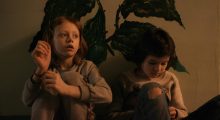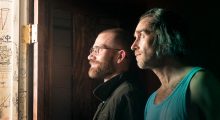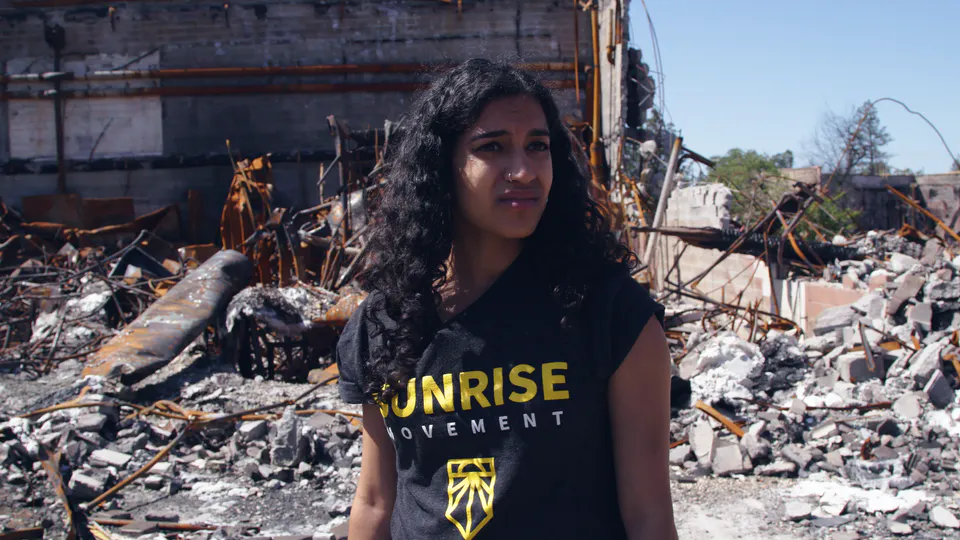17733 Results for “”
-
“No Idea Was Out of the Realm of Possibility”: Editor Michael Felker on Something in the Dirt

Something in the Dirt is the fifth feature by Justin Benson and Aaron Moorhead, indie multi-hyphenates who directed, wrote, shot, co-edited, and produced the story about a pair of fast friends who attempt to turn an encounter with the supernatural into fast money. Co-editor Michael Felker discusses how the film’s form enabled him to take risks and creatively approach the editing process. Filmmaker: How and why did you wind up being the editor of your film? What were the factors and attributes that led to your being hired for this job? Felker: I’ve been the editor for Benson and Moorhead’s […]
by Filmmaker Staff on Jan 23, 2022 -
“Being Overwhelmed Doesn’t Have to Lead to Cynicism”: Rachel Lears on Her Climate Change Sundance Doc, To The End

Cynicism is the dramatic foil in To the End, Rachel Lears’s Sundance Documentary Competition follow-up to her 2020 Sundance picture Knock Down the House. In that film she followed four women — political newcomers hailing from diverse walks of life, all motivated to action by the Trump presidency — as they mounted underdog campaigns to win House seats. That one of the women was New York candidate Alexandria Ocasio-Cortez gave the film a rousingly satisfying ending, even as other women’s losses made clear the forces opposing progressive generational change. Employing a similar structure, To the End follows three young activists […]
by Scott Macaulay on Jan 23, 2022 -
“The Shelter Radiated Human Warmth and Closeness”: DP Simon Lereng Wilmont on A House Made of Splinters

The war in eastern Ukraine has left countless children as orphans, and in the face of systemic failure, the burden to care for them falls mostly on caretakers at overburdened orphanages. Simon Lereng Wilmont made one such orphanage the subject of his latest film, A House Made of Splinters. Wilmont both directed and shot the film, and below he discusses the paradoxes of shooting in an isolated orphanage during COVID and recounts the most difficult scene he has ever filmed. Filmmaker: How and why did you wind up being the cinematographer of your film? What were the factors and attributes that […]
by Filmmaker Staff on Jan 23, 2022 -
“The Best Scenes Tend to Land in the First Pass”: Editor Michael Aaglund on A House Made of Splinters




A House Made of Splinters, the second film by director Simon Lereng Wilmont after The Distant Barking of Dogs, takes place in an orphanage in eastern Ukraine, not far from the front lines. The film focuses on the impact war has on the development of the children as well as on the system that has failed to help war orphans. Michael Aaglund, who served as the film’s editor, discusses how he develops a scene in the cutting room and why he aims for simplicity. Filmmaker: How and why did you wind up being the editor of your film? What were the […]
by Filmmaker Staff on Jan 23, 2022 -
“Just Being Able to Meet Your Subjects Is a Luxury” | Simon Lereng Wilmont, A House Made of Splinters




The last two years have prompted much contemplation and reconsideration of the reasons why we make our films as well as the ways in which we make them. What aspect of your filmmaking—whether in your creative process, the way you finance your films, your production methodology or the way you relate to your audience—did you have to reinvent in order to make and complete the film you are bringing to the festival this year? I miss the hustle and bustle of human interaction—both in the financing and the creative part of the filmmaking process. E-meetings are great in that it […]
by Filmmaker Staff on Jan 23, 2022 -
“Style Is the Choices That Are Made When Placing the Camera”: DP Andrew Wheeler on God’s Country


In God’s Country, a professor navigating discrimination in the workplace whose patience is tested by a pair of hunters who trespass on her property. Anchored by the performance of Thandiwe Newton, Julian Higgins’ feature debut is an understated examination of the human spirit and a woman who refuses to surrender to expectation and stereotype. Andrew Wheeler discusses the importance of camera placement in he film and how his landscape photography prepared him to serve as DP. Filmmaker: How and why did you wind up being the cinematographer of your film? What were the factors and attributes that led to your being […]
by Filmmaker Staff on Jan 23, 2022 -
“The Pandemic Only Brought Us Together” | Krystin Ver Linden, Alice


The last two years have prompted much contemplation and reconsideration of the reasons why we make our films as well as the ways in which we make them. What aspect of your filmmaking—whether in your creative process, the way you finance your films, your production methodology or the way you relate to your audience—did you have to reinvent in order to make and complete the film you are bringing to the festival this year? COVID changed the landscape of filmmaking. It reminded me of the samurai motto: “expect nothing, prepare for everything.” The easiest part of making my first film […]
by Filmmaker Staff on Jan 23, 2022 -
“It Was Better to Encourage the Audience to Ask the Question Than to Provide the Answer”: Editor Justin LaForge on God’s Country


God’s Country is a study of the grieving process and the limits of societal polities. It follows a university professor, at the end of her rope because of her mother’s recent death and discrimination at work, who has her willpower put to the test after she confronts a pair of hunters trespassing on her property. Editor Justin LaForge explains how he was uniquely prepared to edit the film remotely during the COVID lockdown and why it’s better to let the audience ask a question than to preemptively provide an answer. Filmmaker: How and why did you wind up being the […]
by Filmmaker Staff on Jan 23, 2022 -
“You Couldn’t Write This Story; No One Would Believe You if You Did”: Editor Berny McGurk on My Old School


Brandon Lee, 16, moved from Canada to Glasgow and enrolled in Bearsden Academy after the death of his mother, where he impressed teachers with both his knowledge and his temperament: he protected bullied students and helped bullies reform. In My Old School, director Jono McLeod, a former classmate of Brandon, investigates his story. Below, editor Berny McGurk discusses his first experiences in the industry as a teenager and the importance of not overloading the audience and making sure every reveal lands when telling a true story with countless twists. Filmmaker: How and why did you wind up being the editor […]
by Filmmaker Staff on Jan 23, 2022 -
“We Wanted to Find Moments That Celebrated Women Reclaiming Birth”: DP Jenni Morello on Aftershock


With Aftershock, Paula Eiselt and Tonya Lewis Lee turn their camera toward the crisis of the maternal mortality as it affects Black women in the United States. The film focuses on two widowers whose partners died preventable deaths during childbirth as they build support and rally for justice. Below, cinematographer Jenni Morello discusses the challenges of shooting a vérité when everyone is masked and the search for something unusual in every shot. Filmmaker: How and why did you wind up being the cinematographer of your film? What were the factors and attributes that led to your being hired for this […]
by Filmmaker Staff on Jan 23, 2022


